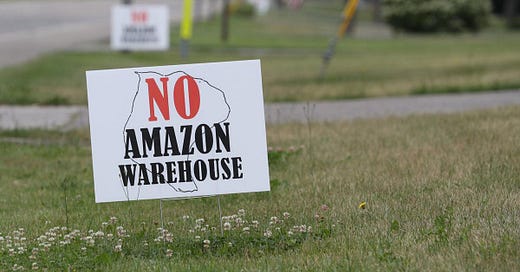
This is Boondoggle, the newsletter about corporations ripping off our states and cities. If you’re not currently a subscriber, please click the green button below to sign up. Thanks!
Usually when Amazon wants to sink its roots into a new community, local leaders go out of their way to shower it with subsidies and regulatory favors. But not always. New York City’s rejection of its share of Amazon’s HQ2 was, of course, the poster child for anti-Amazon advocacy, but other communities, such as Prince George’s County, Maryland, have said no to Amazon dropping warehouses within their borders.
Which brings us to Grand Island, New York. Located in western New York state and sitting in the Niagara River, the island was the proposed site of a massive new Amazon distribution facility.
Many of the area’s residents were not happy about it. So Amazon tried to buy them off. And it didn’t work.
The residents’ complaints focused on environmental concerns and quality of life issues, particularly that increased traffic from Amazon delivery trucks would cause a lot of gridlock. The town’s planning board rejected Amazon’s overture.
Amazon, in an attempt to grease the skids, offered to pay $10 million for a new community center and other infrastructure, including a bike trail, if the plan were approved.
“It’s called an incentive. I would call it more a bribe,” one resident said of the $10 million offer. Yes, that pretty much sums it up. But there was still sufficient enough opposition that Amazon said Wednesday it was pulling out of the project, claiming unspecified “cost increases” and “labor requirements” as the official reason for pulling the plug.
There are two points to make here. First, it’s great to see a community that didn’t want Amazon around stand up and exert its power. Despite all the rosy talk from Amazon and its boosters, warehouses are not helpful to local economies when it comes to job creation or economic growth. Residents decided the downsides weren’t worth it.
Second, the $10 million Amazon offered was much less than it might appear. Erie County, where Grand Island is located, negotiated a deal with Amazon that would have included a 15-year PILOT — a payment in lieu of taxes, which means the company makes a set payment every year that is below what it would normally pay in property taxes.
Everyone involved went to great lengths to not disclose what that giveaway amounted to. Local officials had a non-disclosure agreement that prevented them from even saying which company would ultimately inhabit the warehouse until the deal, nicknamed “Project Olive,” was nearly done, in yet another example of that disturbing trend.
It definitely would have been a lot, though. An economic analysis submitted by Amazon’s developer noted that over those 15 years, Amazon would have paid about $9 million more in revenue to the county than the proposed site would deliver if it remained undeveloped, as well as about $2 million to the Grand Island general fund and some $34 million to the school district.
But in the first year of the PILOT deal, Amazon’s property tax rate would have been reduced by 85 percent. In year two, it would have been reduced by 80 percent, with gradual increases until, finally, in year 16, Amazon paid full freight. Due to those big discounts in the early years, I’d bet Amazon’s savings from the PILOT would have exceeded the $10 million it offered to the city.
This is a trick Amazon has pulled elsewhere: Receive huge tax reductions and then make much smaller “philanthropic” offerings to buy good will and good press, while still coming out ahead. The tax breaks from the county weren’t really been a focus of the opposition, from what I saw (and someone closer to the action can let me know if that’s wrong), but they were still a pretty good reason to say no to the deal. If Amazon wants to be somewhere specific, it can pay its own way.
Indeed, it’s always worth remembering that Amazon puts warehouses where they make the most sense for its business: Locations that are near major transportation routes and that have concentrations of wealth and Amazon Prime subscribers. That’s why it keeps building new warehouses with no subsidies from the state at all, like a new project it announced in Michigan this week. In fact, Erie county officials weren’t keen on Grand Island as a site for a warehouse at all, but Amazon pushed it because of the proximity to highways and Canada.
Amazon wants communities to think the company is doing them a favor when it expands its network, (which, it should be noted, also increases its power over local businesses and local politicians). But locals have power too, and it’s good to see when they use it.
One more thing: Nike is laying off hundreds of workers in Oregon, a state from which is has received more than $2 billion (with a b!) in subsidies. That’s very bad. But these responses from local residents about the taxes Nike didn’t pay are very good.

Thanks for reading this edition of Boondoggle. If you liked it, please take a moment to click the little heart under the headline or below. And forward it around to friends, family, or neighbors using the green buttons. Every click and share really helps.
If you don’t subscribe already and you’d like to sign up, just click below.
Finally, if you’d like to pick up a copy of my book, The Billionaire Boondoggle: How Our Politicians Let Corporations and Bigwigs Steal Our Money and Jobs, go here.
Thanks again!
— Pat Garofalo


